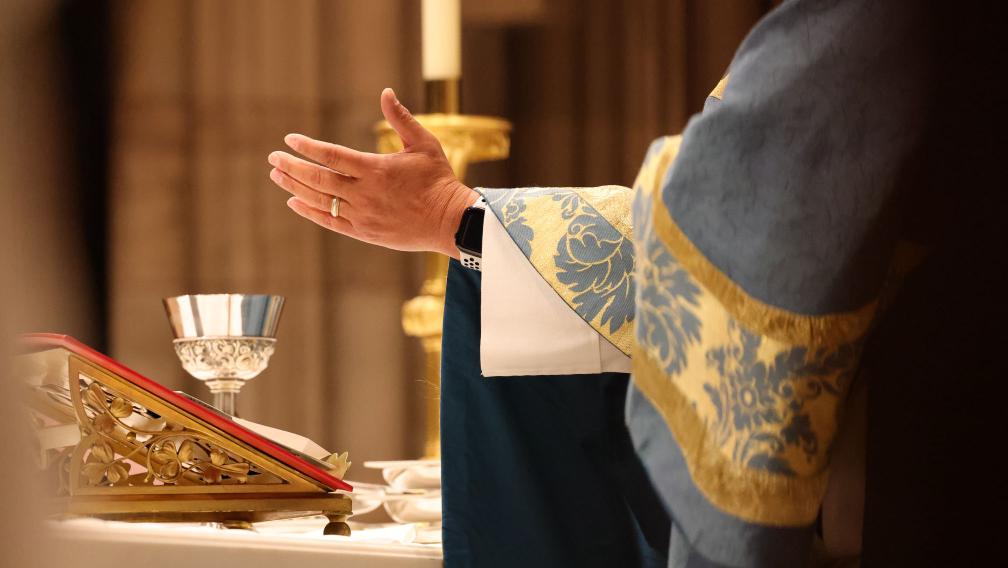In those days John the Baptist appeared in the wilderness of Judea, proclaiming, “Repent, for the kingdom of heaven has come near.” This is the one of whom the prophet Isaiah spoke when he said,
“The voice of one crying out in the wilderness:
‘Prepare the way of the Lord,
make his paths straight.’”
Now John wore clothing of camel’s hair with a leather belt around his waist, and his food was locusts and wild honey. Then the people of Jerusalem and all Judea were going out to him, and all the region along the Jordan, and they were baptized by him in the river Jordan, confessing their sins.
But when he saw many Pharisees and Sadducees coming for baptism, he said to them, “You brood of vipers! Who warned you to flee from the wrath to come? Bear fruit worthy of repentance. Do not presume to say to yourselves, ‘We have Abraham as our ancestor’; for I tell you, God is able from these stones to raise up children to Abraham. Even now the ax is lying at the root of the trees; every tree therefore that does not bear good fruit is cut down and thrown into the fire.
“I baptize you with water for repentance, but one who is more powerful than I is coming after me; I am not worthy to carry his sandals. He will baptize you with the Holy Spirit and fire. His winnowing fork is in his hand, and he will clear his threshing floor and will gather his wheat into the granary; but the chaff he will burn with unquenchable fire.”
Matthew 3:1–12
Matthew’s vision of Jesus’s arrival doesn’t mesh well with our conventional view of the coming of Christmas. No angels or songs here. Instead, we get a strangely dressed man in the wilderness talking about sin, repentance, and fire and calling some people vipers. Definitely not a story that fits into the chatter of a typical holiday party. Yet, John the Baptist is the entry point to meeting Jesus, who declares the reign of God.
Sin, repentance, and judgement carry a lot of negative weight for humans living in today’s world with emotions of shame, guilt, and condemnation following close behind. But what if we considered sin as a matter of how we relate to what we have — be it power, resources, or material goods?
What if we saw repentance as the correcting response when we use our power, resources, and material goods in ways that do not benefit, but rather hurt, our neighbor and the earth?
And maybe being called into judgement is a call to see the world as it really is, in all its glory and pain, and to be given another chance to respond to it all with love.
—Ruth Frey
THEOLOGY
Debie Thomas offers that “Not only is the wilderness a place that exposes our need for God; it’s a place that calls us to repentance.”
SOCIAL JUSTICE
The Rev. Karen Hanson reminds us that “to prepare the way of the Lord” means “Christians are called to do the work of removing obstacles that keep people from the full, liberating deliverance of God.”
VISUAL ART
The Quaker artist Edward Hicks created many works depicting the “Peaceable Kingdom” described in today’s reading from the prophet Isaiah (“…the calf and the lion will feed together, and a little child shall lead them…”). In this rendition, Hicks depicts William Penn’s treaty with the Lenape in the background, an “idealized encounter between British colonists and Indigenous people…Ultimately, the Lenape were forced out of Pennsylvania owing to fraudulent land deals perpetrated by Penn’s sons” (commentary from the Brooklyn Museum of Art).
MUSIC
O come, O come, Emmanuel expresses the longing for Jesus’s arrival.
POETRY
Mary Oliver tells us of the connection of all creation: “This is a poem about the world that is ours, or could be.”
Get the Five Ways In Your Inbox
Sign up to receive reflections and updates from the Faith Formation & Education team.
Coming Soon
Sunday, December 4 | 10am
Discovery: Hospitality of the Table
Conversations on Food Justice
How are we physically and spiritually fed? Learn more in this series with Metha Balasquides, Trinity’s Program Coordinator for Outreach, and Regina Jacobs, chairperson of Trinity’s Hospitality committee. In this first session, Metha Balasquides talks about Trinity’s current food insecurity initiatives, and ways you can get involved in caring for those in our neighborhood.
Wednesday, December 7 | 5:30pm
Sacred Ground Information Session
Join Trinity’s Sacred Ground group starting in January. Created by The Episcopal Church, Sacred Ground is a film- and readings-based dialogue series on race, grounded in faith. Small groups walk through chapters of America’s history of race and racism together, while weaving in threads of family story, economic class, and political and regional identity. The curriculum focuses on Indigenous, Black, Latino, and Asian/Pacific American histories as they intersect with European American histories. Contact Ruth Frey to learn more about this transformative program and to register.
January 6–8 | Trinity Retreat Center
Hide & Seek: Reading the Song of Songs with Poets
No book of the Bible maps the landscape of love — human and divine — like the Song of Songs. For centuries the Song’s depiction of love’s push-and-pull has fed Christian devotion. Unsurprisingly, some of the ancient poem’s best interpreters have been poets. On this retreat with Nate Wall, we’ll venture into the Song of Songs accompanied by Christian poets old and new.
